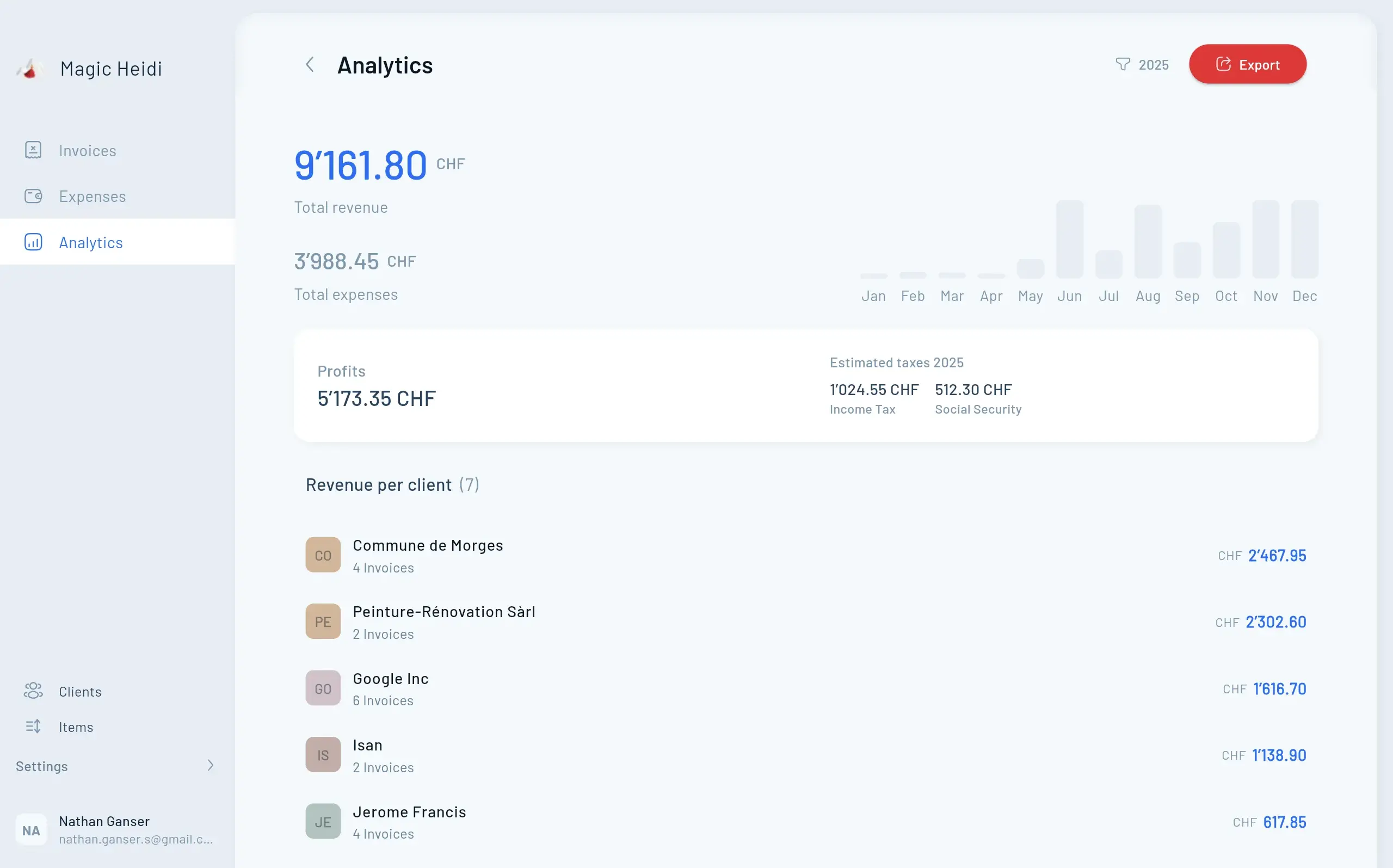How to Become a Freelancer in Switzerland
Step-by-step guide to Swiss freelancing: AVS registration, VAT, accounting & tax deductions. Start your independent career with confidence.

Starting your freelance career in Switzerland? You're joining a thriving community of over 326,000 independent professionals who've chosen the freedom and flexibility of self-employment.
This guide walks you through everything you need to know—from your first client invoice to VAT registration—with current 2026 regulations and practical steps you can follow today.
What Does 'Self-Employed' Mean in Switzerland?
According to Swiss federal law, you're considered self-employed (indépendant/selbständig) when you meet these criteria:
Work in Your Own Name
Operate independently on your own accountAssume Economic Risk
Take responsibility for your business activitiesMaintain Autonomy
Control how you organize and execute workServe Multiple Clients
Work with at least 2-3 different customersManage Infrastructure
Handle your own resources and toolsThe Swiss Freelance Advantage
Strong earnings, legal protection, and complete autonomy.
Are You Eligible to Freelance?
Before diving into the process, confirm you meet the residency requirements for freelancing in Switzerland.
Full freelancing rights
With B permit (residence)
Permanent residence status
Permit G with weekly return
Start Working First, Register Later
Here's what surprises most aspiring freelancers: you cannot register as self-employed before you actually start working. Swiss authorities require proof of activity before granting independent status. You need invoices, contracts, or client agreements to show you're genuinely operating as a freelancer.

Land Your First Clients and Invoice Them
Start by securing at least 2-3 clients and providing your services. When you complete the work, issue professional invoices.
- 👤Your Full Details
Name and complete address
- 🏢Client Information
Name and business address
- 📝Service Description
Clear breakdown of work delivered
- 💰Amount & Terms
CHF amount, payment terms, date
- Invoice #3
Magic Heidi
CHF 500
Jan 29
- Invoice #2
Webbiger LTD
CHF 2000
Jan 24
- Invoice #1
John Doe
CHF 600
Jan 20
Create Your First Invoice
Magic Heidi lets you create professional Swiss-compliant invoices in minutes, even before you're officially registered.
Register With the AVS/AHV (Mandatory)
Once you've started activity and have documentation, register with your cantonal compensation office.
When to Register
Register within your first months of activity. Early registration ensures faster social security protection, backdated coverage from start date, and avoided gaps in pension contributions.
- Must register if income exceeds CHF 2,500/year
- No strict deadline before starting
- Coverage backdated to start date
- Ensures continuous pension contributions
Required Documents
Prepare these documents for your cantonal compensation office:
- Completed affiliation form
- 2-3 invoices or contracts as proof
- Copy of residence permit (if applicable)
- Business letterhead or website
- Civil liability insurance proof
AVS Contribution Costs
AVS contributions are 10% of your net income for earnings above CHF 60,500 annually. Below this threshold, you benefit from reduced rates on a degressive scale.
- Old-age pension (AVS/AHV)
- Disability insurance (AI/IV)
- Income compensation (APG/EO)
- Family allowances (varies by canton)
Important AVS Details
As a freelancer, you pay both employee and employer portions. Employees pay only ~5.3% because employers cover the other half.
Finding your office: Each canton has its own compensation office. Search for "Ausgleichskasse your canton" or "Caisse de compensation your canton" to find yours.
Set Up Your Accounting System
Swiss law requires you to maintain financial records for at least 10 years. The complexity depends on your turnover—under CHF 500,000 allows simplified accounting, while above requires full double-entry bookkeeping.

Simplified vs. Full Bookkeeping
Choose the right accounting method based on your annual turnover.
| Requirement | Under CHF 500k | Above CHF 500k |
|---|---|---|
| System Type | Simplified 'Milchbüchlein' | Double-entry bookkeeping |
| What to Track | Income, expenses, receipts, bank statements | Balance sheet, P&L, general ledger |
| Tools Needed | ✓ Excel or specialized software | Comprehensive accounting software |
| Professional Help | ✓ Optional | Accountant recommended |
Built Specifically for Swiss Freelancers
Magic Heidi handles all your freelance accounting needs in one beautiful platform.
- 🧾Invoice Creation
Swiss-compliant templates in seconds
- 📸AI Expense Tracking
Snap receipts, extract data automatically
- 🏦Bank Import
Automatic statement reconciliation
- 💳VAT Management
Ready when you need it
- Invoice #3
Magic Heidi
CHF 500
Jan 29
- Invoice #2
Webbiger LTD
CHF 2000
Jan 24
- Invoice #1
John Doe
CHF 600
Jan 20
Try Magic Heidi Free
Everything you need, nothing you don't—designed by Swiss people for Swiss freelancers.
Step 4: Commercial Register (Optional Under CHF 100k)
Registration in the Commercial Register (Handelsregister/Registre du commerce) is:
Mandatory when:
- Your annual turnover exceeds CHF 100,000
Optional but beneficial when:
- You want to protect your business name
- You need additional credibility with clients
- You operate in competitive markets
Registration costs vary by canton (typically CHF 150-600) and requires renewal fees.
VAT Registration at CHF 100,000
Once your annual turnover reaches CHF 100,000, VAT registration becomes mandatory.
Charge VAT on Invoices
Add the appropriate VAT rate to all invoices and include your CHE number (Swiss business identifier).
- 8.1% standard rate (most services)
- 2.6% reduced rate (food, books, medicines)
- 3.8% special rate (accommodation)
- Must display CHE number on invoices
Reclaim VAT on Purchases
The upside—deduct 8.1% VAT from all your business expenses! Office equipment, software subscriptions, business travel—you get 8.1% back.
- Deduct VAT on business equipment
- Reclaim VAT on software subscriptions
- Get back VAT on business travel
- All business-related purchases eligible
New 2025 Simplifications
Eligible SMEs can now file VAT returns annually instead of quarterly under the revised Swiss VAT Act.
- Annual instead of quarterly filing
- Automatic VAT calculation
- Input VAT tracking
- Support for all three Swiss rates
Essential Tax Deductions
The fastest way to increase your take-home income? Claim every legitimate business expense. Swiss freelancers often miss thousands in deductions.

What Freelancers Can Deduct
Track these expenses to maximize your tax savings.
Business Travel
Client meetings, conferences, mileage at CHF 0.70/km (2026), public transport, parking
Home Office
Proportional rent/mortgage, utilities, internet, phone, office furniture
Professional Development
Courses, training, industry publications, professional memberships
Business Meals
Client meetings (50% deductible), must document business purpose
Pillar 3a Pension
Up to 20% of net income, capped at CHF 36,288 (2026)
Equipment Depreciation
Computers, cameras, tools over CHF 1,000 depreciated over 3-5 years
Insurance Premiums
Business liability, professional indemnity, business interruption
Track Everything with AI-Powered Expenses
Magic Heidi's expense tracking ensures you claim every legitimate deduction.
- 📸AI Receipt Scanning
Snap a photo, extraction done automatically
- 📊Auto-Categorization
Expenses sorted for tax time
- 🚗Mileage Tracker
GPS-integrated distance tracking
- 📋Tax Reports
Complete expense reports generated instantly
- Invoice #3
Magic Heidi
CHF 500
Jan 29
- Invoice #2
Webbiger LTD
CHF 2000
Jan 24
- Invoice #1
John Doe
CHF 600
Jan 20
Can You Combine Employment With Freelancing?
Yes, absolutely. Many Swiss professionals work part-time employment while building their freelance business.
Key points:
- Both income streams are taxed (declare both)
- Separate AVS contributions for each
- No conflict of interest with your employer
- Must have capacity for independent work (true autonomy)
This hybrid model lets you maintain income security while developing your client base.
Common Freelancing Mistakes to Avoid
Learn from others' mistakes and save yourself time, money, and legal headaches.
No Written Contracts
Even small projects need agreements defining scope and paymentUndervaluing Work
Research market rates—Swiss average is CHF 120-130/hourInsufficient Income
Non-Swiss citizens need adequate income for permit renewalDisguised Employment
Working exclusively for one client risks reclassificationMissing Tax Deadlines
Tax returns due March 31—late filing incurs penaltiesPoor Record Keeping
Must keep all documents for 10 years (digital is acceptable)When Should You Consider a Sàrl (LLC)?
Most freelancers start as sole proprietors (raison individuelle), but upgrading to a Sàrl makes sense when:
- Your net profit consistently exceeds CHF 100,000
- You want to limit personal liability
- You're hiring employees
- You need more credibility for large contracts
Sàrls require:
- Minimum CHF 20,000 capital
- More complex accounting
- Higher administrative costs
- Corporate tax structure
For most freelancers in their first years, sole proprietorship is simpler and more cost-effective.
Working With International Clients
VAT treatment varies based on client location and type.
B2B Services to EU
No Swiss VAT charged—client handles VAT in their country through reverse charge mechanism.
- No Swiss VAT on invoice
- Client self-assesses VAT
- Keep proof of client's VAT number
- Document service delivery location
B2B Services to Non-EU
No Swiss VAT charged on services delivered outside Switzerland.
- No Swiss VAT applied
- Document client location
- Keep contract records
- Verify export rules
B2C Services (Consumers)
Swiss VAT applies if service is delivered in Switzerland, regardless of client location.
- Apply Swiss VAT rates
- Varies by service type
- Check canton-specific rules
- Document delivery location
Your Freelance Insurance Checklist
Unlike employees, freelancers must arrange their own coverage beyond mandatory health insurance.
Mandatory within 3 months (Grundversicherung)
Protects against client claims (highly recommended)
For consultants and advisors
Covers illness or disability periods
The Swiss Freelance Timeline
Here's a realistic timeline from decision to full operation:
Month 1:
- Validate business idea
- Identify first 2-3 potential clients
- Set up basic infrastructure (website, business email)
Month 2-3:
- Land first clients
- Complete initial projects
- Issue first invoices
- Collect documentation
Month 3-4:
- Register with AVS compensation office
- Set up accounting system
- Open business bank account (optional but recommended)
- Arrange business insurance
Month 6+:
- Optimize tax deductions
- Streamline operations with software
- Build client portfolio
- Plan for growth
Year 2+ (if exceeding CHF 100k):
- Register for VAT
- Consider commercial register
- Evaluate Sàrl vs. remaining sole proprietor
Start Your Freelance Journey with Magic Heidi
You've got the knowledge—now you need the tools. Magic Heidi gives Swiss freelancers everything they need in one beautiful, intuitive platform.
Your Freelance Checklist
Everything you need to remember for a successful Swiss freelance career.
Start Before Registering
Work first, use invoices as proof for AVS registration
Register With AVS Early
Within first months once you have 2-3 clients
Keep Meticulous Records
10-year requirement for all business documents
Track All Expenses
Deductions significantly increase take-home income
VAT at CHF 100k
Register for VAT when turnover exceeds threshold
Use Proper Tools
Specialized software saves time and prevents errors
Multiple Clients
Protects your independent contractor status
Plan for Taxes
Set aside 30-40% of income for AVS and taxes
Frequently Asked Questions
Do I need to register before sending my first invoice?
No. You must start activity first and use those invoices as proof when registering with AVS.
How many clients do I need?
At least 2-3 clients to demonstrate genuine self-employment. Working for only one client risks reclassification as an employee.
Can I use my personal bank account?
Yes, legally you can. However, a separate business account (even if informal) makes accounting much easier.
What if I earn less than CHF 2,500/year?
You're not required to register with AVS, but you may want to for pension contribution coverage.
How long does AVS registration take?
Typically 2-6 weeks after submitting complete documentation.
Can I deduct my home office?
Yes, if the workspace is necessary for your business (not just convenient) and you use it regularly and exclusively for work. Calculate proportionally by square meters.
What's the difference between sole proprietor and Sàrl?
Sole proprietorship is simpler and cheaper to start, but offers no liability protection. Sàrl requires CHF 20,000 capital and more complex accounting, but limits personal liability and may offer tax advantages at higher income levels.
Can I freelance while employed part-time?
Yes, absolutely. Many Swiss professionals combine part-time employment with freelancing. Both income streams must be declared for taxes, and you'll have separate AVS contributions for each.
Ready to Start Your Swiss Freelance Career?
Magic Heidi is your partner every step of the way—from your first invoice to VAT registration and beyond.
Last updated: January 2026. Swiss regulations and thresholds are subject to change. This guide provides general information and should not replace professional legal or tax advice for your specific situation.
Related Guides for Swiss Freelancers
Explore more resources to help you succeed as an independent professional in Switzerland:
Getting Started
- Complete Guide to Sole Proprietorship in Switzerland
- What to Do After Your Studies – Starting a Business
- Freelancing in Switzerland: In-Depth Guide
Business Essentials
- How to Set Your Hourly Rates as a Freelancer
- Working Hours and Time Tracking Best Practices
- Managing Multiple Businesses as a Freelancer
Financial Management
- Simplifying Expense Tracking for Freelancers
- Tax Deductions for Swiss Self-Employed
- How to Keep Accounting Records
- Understanding Depreciation and Recording Assets
Insurance & Benefits
Workspace Options
Alternative Business Models